 |
| Early morning light in Rabinal, waking and starting a new day of hiking. |
Day 14
By the time we got to Rabinal, we were into the heart of our Camino journey, with majestic people
and adventures, lovely spaces, and sometimes very, very long days.
and adventures, lovely spaces, and sometimes very, very long days.
Rabinal del Camino was dying before the Camino
resurgence, abandoned. Today, it is a
Moragato village the Camino has brought it to full life.
We woke early. The elder German man was in the
courtyard to send everyone off in good spirits.
He helped us with our straps on our backpacks.
“I feel like its going to be a good day,” I noted as
we left.
“Every day you are alive is a good one,” he
followed.
“Adios.”
“No, hasta luego.”
He really did believe we would see each other again.
My new walking stick helped as we meandered forward
after some eggs. Stomachs full, the sun was just about to climb up the horizon,
still dark. Caroline says I look like a Gandolph. Its eyes seem to look at me, keeping me in
check as I walk.
We’d wander from to Foncebadon up to Cruz Ferro ,
and the highest point in the Irago mountains before descending to Molinaseca,
where the old German suggested we stay the next night.
“That’s not too far to walk,” he man suggested,
pointing to the 25 k stroll up and down the mountain.
“They have great food,” he recommended, pointing to
El Palacio, in Molinaseca.
So we walked, feeling the magic of the trail,
walking the next five days in a cheerful mood, stopping in Foncebadon, a Santa Cruz
like, lost place, in between time, hatched in the and trees, like Alice’s
Restaurant, full of crumbling stone buildings on the outskirts of the Irago
mountains. A former site of a Roman road and pilgrimage stop, its history feels
everywhere. We stop for coffee, chatting with the Portugese judge, who is
pleased his daughter just let him know she has a new baby in her stomach. He seems to miss his family. The mountains feel ethereal.
Over the next two K, we’ll make our way to the
highest point in the Irago mountains, the Cruz Ferro. Marked with a wooden pole and a cross first
erected by the Celts, and later appropriated by the Romans for Mercury, the god
of travel and tricksters. Hermes will be
getting us into trouble for much of this walk, laying traps and supporting our
merry band. Everyone leaves messages and monuments of love, stones, cigarette
packs and memorabilia for loved ones atop the site, which was reappropriated as
a Christian site by the Hermit Guacelmo. Today, it helps the pilgrams,
reminding them to let go. Each stone
left here seems to lighten the burden of the past and its weights. We are reminded to carry less to navigate the
road.
After a long break, we start wondering, making our
way down to Manjarin in the next two K.
There, at the Refugio de Manjarin, we greet Thomas, a modern day member
of the Knights Templar, who offers us coffee at his refuge, full of signs
marking the path and the distance to New York, Rome, Mexico, and Santiago, the
222 k, we’ll traverse in the next ten days.
The road gradually becomes steeper and steeper, with
stones, hazards for ankles and knees lining the descent to Molinaseca. I’m realizing there was a reason why I bought
my silly stick the night before. It
helps with the incline. The walk is stunning, with winding mountain views, up
and down, curving roads that demand our full attention. One bad step on a rock
and a twisted ankle could ruin the trip. The ancient chestnut trees by Riego de
Ambros seem to greet us, sharing their insights and stoic resolve to stay put
and patient through the years. Walking from the highest points of the Camino,
its some of the most beautiful walking of my life.
We descend into villages of Aciebo and Riego.
Walking through these ancient villages is inspiring. Who were the people here? What were their lives like?
“Its magic to be here with you, exploring these
towns, these medieval villages with you.
I always wanted to come back to these places after my year in
Italy. Its been a dream to see it. And now we are seeing it,” I confess.
“But your life is about so much more,” retorted
Number Two. “You want to organize and
teach and write.”
“Yes, and I do.
But there is also this, connecting, history, time and space. Walking we don’t just read about it, we feel
it. We experience it. We are part of
it.”
Walking out, we find paths full of trees. I stop to take a photo of grand majestic tree. Number two looks and then starts to turn
around.
“Dad lets go back,” she begs, scared of a sound like
a wolf. “
I walk up to her. I hold her hand and we start to
sing, “Hey Jude” and “This Land is Your Land” to get through the scary forest.
As I walk, I think of my dream from the night before
of my dad walking. But then he did not
walk. And we are. He came home from his trips sicker and
sicker, needing to stay at the Tallahassee Tropical Disease Hospital. But we’re making our own way. My sickness in Burgos connects me with Dad’s
travels on the road. I wish we could be
walking further through time.
It’s a lot of work to walk over a mountain and back
down. But that’s what we did. Number two and I walk ahead, watching our
steps as we make our way down, hoping not to twist and angle as we wander down.
Gradually, I started to hear the sound of a group of kids screaming. I know
that sound, that joyous sound.
Walking closer, we see a bridge, Puente de Peregrino
over a river where kids are cavorting in cool water of the Rio Meruela. Kids
were swimming everywhere. We frolic with
them. Its hard to describe how exquisite
the water feels after such an exhausting hike.
Words cannot come close to approaching the crisp, refreshing feeling,
the cleansing feeling of the sweat pouring off as the water sooths and heals
us. Soon enough, number one and Caroline
joined us. We swim and gradually lay down for an afternoon nap along the
riverbank. What a glorious day. The Camino reminds us to appreciate so much, the
clear cool waters greeting us and keeping us alive. Their absence on the trail
reminds us how delightful these gifts really are, clean fresh water to be
honored and preserved.
“Truly to enjoy bodily warmth, some small part of
you must be cold,” notes Herman Mellville in Moby Dick. “There is no quality in
this world that is not what it is merely by contrast. Nothing exists in
itself.”
My brother has been walking the Camino for years. Last year, he said he wanted to buy a house
by the Rio Meruela, where we could all jump in the water.
I walk through the town looking out and back to get
ready for dinner.
The meal at El Palacio could not be better. Some of
the menu del dias surpass all expectations.
With the exception of Astorga, I’ve enjoyed them all. The old German was right, this meal is
superb.
The judge from Portugal, the Professor and son from Philadelphia are sitting outside
after dinner. We chat a minute and
enjoy the scene as the sun goes down.
There is always a fine feeling in seeing fellow walkers along the way,
as we meander through the road together, making our way out at different times
and distances, only to reunite again along the road. Gradually, we start to feel the Camino as a
re emerging, appearing and disappearing city of friends. There is something special when we see each
other again, smiling and recalling these moments.
Day 15
“I am 46 years old.
I am willing to admit. My tastes
have changed,” confessed Caroline on our way out of town. “I’ve done a lot of slumming but I’m not
sleeping with a bunch of college kids. I
have slept on beaches and lots places. Gone
hitch hiking across the country, but not any more.”
We talk with friends as we walk out of town. Some of the Italians who have been riding for
days are making their way out of town. I ask if they ever wear helmets,
imploring them to take care of themselves.
“I was riding like a crazy person yesterday,” one
admits.
“Buen Camino,” they cheer, as we make our way.
We’ll walk through Ponferrada on the way to
Cocabelos today, some 25 k.
We start the day with a few inclines before we
complete the eight k walk to the old Celtic village of Ponferadda. The Romans, Visigoths, Muslins and Spanish
have all claimed this old Pilgrim settlement.
The judge is here having a coffee, talking with his
wife on the phone. She’s not coming to join him on the hike. Her sister has
gotten sick so she must attend to her. This is a blow. He’s in the next phase of his life now,
without his kids, who now have their own kids. And he confesses, at times it
feels lonely.
The Camino is about emotion, pain, grief, anger, and
sometimes more anger. For the kids, its
really hard. All summer, they get texts
from their friends about the tv shows they are watching or their trips to Hawaii. And then they step out for another 20 k leg
of their daily pilgrimage hike. We’d
like it to always be fun. But it is not
always. But they learn they can walk through a lot.
Antonio and his son did not talk to each other for
days along the Meseta.
Sitting at the café, the girls drink smoothies and
we chat with a group who have walked from Belgium to Spain by foot. They show us their passports and we all get
up to walk out of town.
The signs are confusing and unclear. And the noonday giants are joining us
again. The girls are getting tired. Our next town is 18 k off. And the trip wears on us. Number one wants us
to stop again to use the bathroom.
Number Two wants to call a cab. We all start bickering. Everyone calls
me a tyrant. We keep walking, finally stopping a monastery where they have
aquaria vitamin drinks and chupa chupa lolly pops for the gang. The man sells them to me for almost nothing,
seemingly sensing the gloom emanating from my body. Number One was able to go to the
bathroom. Number Two got a rest.
So we talked about how to walk together, even if we feel apart. We talked about trying it another way and
kept on going.
None of the books about the trail come close to
approximating that moment at one or two in the afternoon, its hot, and we are
all tired and everyone has another ten k to go to get to the town where you are
staying. That is a demon we fight every
day. But in pushing through extraordinary things happen. We learn we can do
it. We learn there is more in us than we
previously thought.
Yet, we eventually make our way the twelve k to
Cacabelos. Outside the town looks like a truck stop. I pass by the Iglasia Santa Maria on the way
to our albergue on the edge of town.
Walking I stumble into a bridge across the Rio Meruela, where more kids
are playing. Some have erected a diving
board some ten feet over the water.
There is a line of kids standing there to jump, one after another. Number Two and the rest of the family join me
in the water. As we wait to jump off the
diving board, a young woman, perhaps 16 steps over the walking path of the
bridge, standing on the ledge about to jump. The whole line stops. Everyone in the water stops swimming, looking
up. Everyone is looking at her and she
is chatting away with her friends. Will
she jump or won’t she? She stands there
for some five minutes deliberating. I
ask the guys in line for the diving board why they are not moving. We are waiting for her, they gesture. And eventually, she jumps the 75 feet down to
the water, farther than any of the boys have jumped. The whole river breaks out in applause. The
moments of joy along the Camino offer so much relief. The difficult moments usually wane. And we
find the joy of our collective experience together on the road.


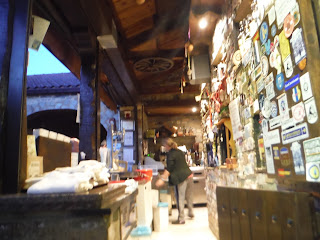




















































































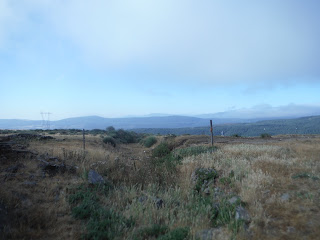


















































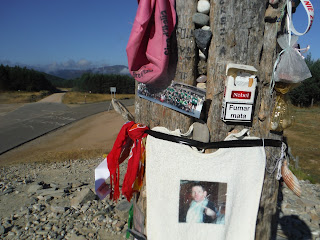





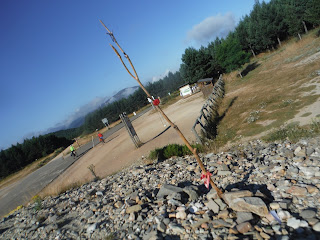







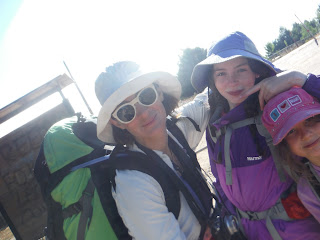




















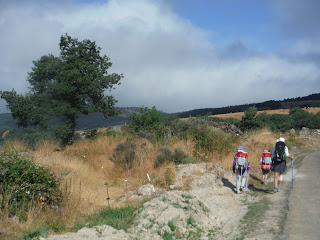



































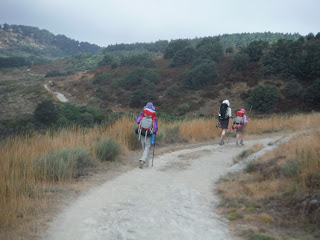

































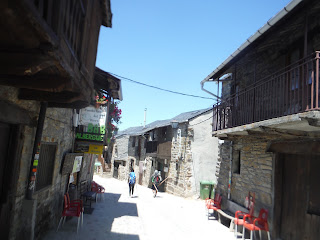








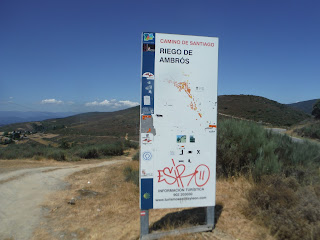





























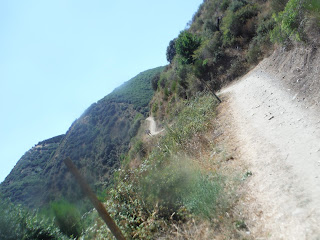





















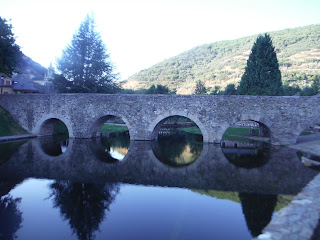











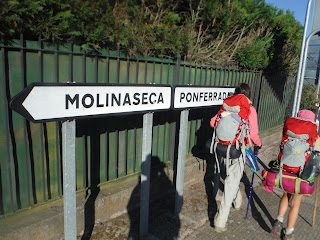















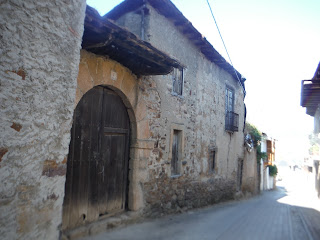

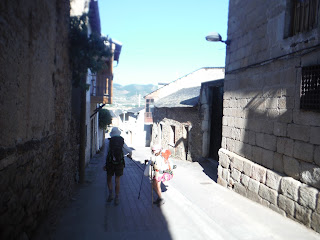
















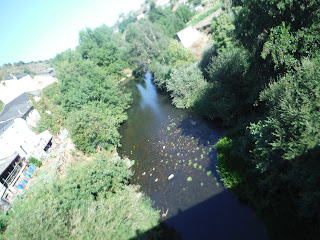
















































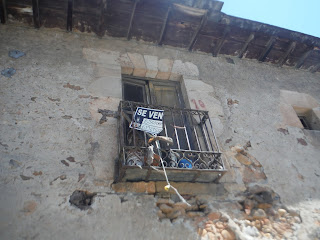






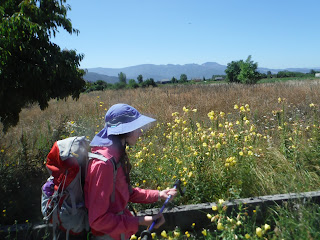















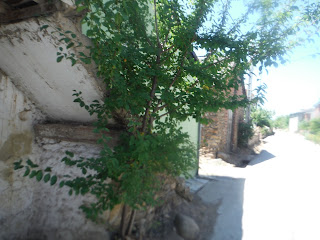


























































No comments:
Post a Comment